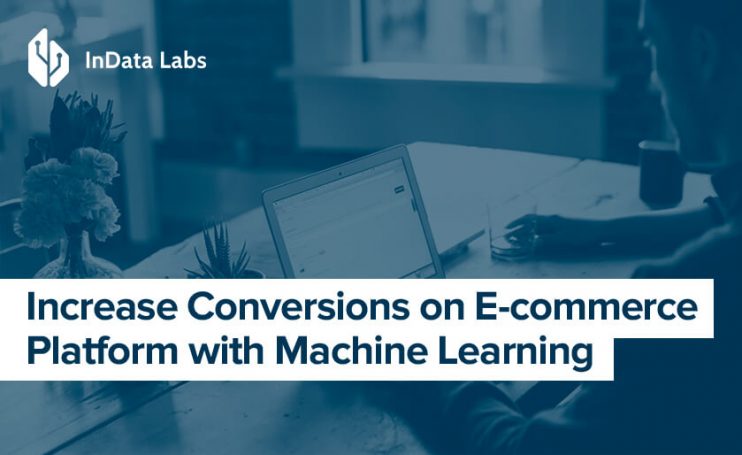When it comes to discussing the role of advanced technology for business, intelligent automation, artificial intelligence, and machine learning in E-commerce get the most attention. E-commerce providers face increased competitiveness as consumers are now shopping online far more often than ever. They need technology to achieve business goals.
So, what has triggered the growth of the E-commerce market? What are the AI trends in E-commerce and how could AI and machine learning assist E-commerce providers looking for ways to win new customers and gain a competitive advantage?
This article discusses the future of the E-commerce industry, the reasons this industry and online retail are growing exponentially, the power of E-commerce machine learning projects, and ways industry players may benefit.
The Game-Changing Role of Technology in E-commerce
The outbreak of COVID-19 has affected buying habits since the lockdown forced people to stay home and go shopping online. In 2020, U.S. consumers spent over $860 billion – it is 44% more than in 2019. The total sales amount grew by almost 7%, and E-commerce businesses gained an additional $174.87 billion in revenue.
Many businesses need to go digital and revamp their approaches to interacting with customers, offering, and delivering goods. With machine learning models for E-commerce, providers may use big data to elevate customer experience, AI-enabled chatbots to improve the quality and speed of responses, and intelligent automation to make purchase delivery faster.
There are many applications of machine learning in E-commerce, and one common factor unites them all: the quality of data. Data determines the power of any ML-based model. Valuable training and testing data would allow teaching machines to forecast sales, analyze consumer preferences, recommend the right products to the right consumers, define marketing channels to maximize sales, and improve conversion rates.
To take advantage of machine learning E-commerce applications, business owners need to know the principles of how this technology works and its uses.
Machine Learning Types and Working Principles
ML is a field of AI that uses computer algorithms to learn and improve on its own. The process involves training and testing phases. Training includes feeding massive amounts of data to teach machines to make predictions based on the input. After that, a model goes through testing and comparing results with real-world data. By testing and checking the accuracy of algorithms, data scientists fine-tune machine learning predictions and empower computers to learn new skills.
ML algorithms fall into three main categories:
- supervised learning
- unsupervised learning
- partially supervised learning.

Source: Unsplash
The difference is in the degree of human involvement needed for creating a model. By definition, supervised machine learning requires input and output pairs provided by data engineers. During unsupervised learning, machines independently structure data and find patterns based on given sets of characteristics. Complex tasks may require using partial supervision, which is a combination of two other types.
Which type to choose depends on tasks and objectives since machine learning use cases in E-commerce are rather diverse. Owners who wish to improve sales, raise conversions, and tailor better products may learn from the examples of uses.
5 E-commerce Machine Learning Applications You Should Use to Improve Business Results
Let’s review a range of value-adding applications and the advantages of machine learning in E-commerce that service providers and product creators may gain.
Enhanced Personalization
ML helps in personalizing a customer journey and improving data analytics. Providers use rich datasets to teach E-commerce machine learning algorithms to determine how consumers interact with brands’ websites, what sections they prefer, and what changes would make a website more appealing for them.
Besides, big data enables ML algorithms for E-commerce that providers may use to improve product search and recommendations. If consumers receive personalized suggestions and highly relevant search results based on personal preferences, they are more likely to return.
Product and Service Promotion
Providers use machine learning in E-commerce to improve the ways they promote products or services. They may achieve that goal by automating different processes, including pricing, making product descriptions, monitoring customer feedback across social media, and many more.
E-commerce machine learning algorithms help brands gather information about their products or services and identify what enhancements are needed to upgrade a brand’s offer. They may start from redesigning a marketplace UI/UX, improving delivery time, or introducing cutting-edge features like web augmented reality or drone delivery.

Source: Unsplash
Customer Service Improvement
Whenever consumers face poor support or lack of attention on a provider’s side, they are most likely to go to some other marketplaces. To prevent customer churn, providers should check how effectively they deal with troubles. Consumers are likely to stay with a favorite brand and purchase more if they feel a provider addresses issues on a case-by-case basis. On this point, chatbots may be a handy tool that requires little to no involvement of human operators. Those ML-based E-commerce solutions permit automated 24/7 responses to customer queries.
Competitive pressure in the E-commerce industry is always high, and brands have to focus on personalization to survive. By personalizing services, they may improve customer satisfaction and loyalty, and brand ratings. Factors like buying behavior, purchase history, and purchasing preferences play a central role in elevating customer experience provision and increasing customer loyalty. ML permits the processing of massive amounts of data at almost the speed of light, thus helping in building hyper-personalized experiences.
Marketing and Sales Boost
Intelligent algorithms may help revamp traditional approaches to customer acquisition and retention. Using patterns revealed by ML algorithms, brands might expect to see a surge in customers. Marketers may use the output to improve promotion strategies, and sales departments may revise lead generation tactics and unearth new channels to reach out to new audiences.

Source: Unsplash
Also, a range of analytical and data-related tasks can be automated with the use of machine intelligence. Machines can now handle tasks like social media analysis, feedback processing, audience scanning, or lead analysis. By using ML, E-commerce providers might assign more tasks to machines to achieve maximum efficiency and reduce costs.
Supply Chain Management
Logistics and delivery are crucial for E-commerce since both aspects affect customer experience immensely. An optimized website will be far less effective if a customer doesn’t get an order at the right time. Supply chain challenges can be solved with the aid of machine learning, and E-commerce providers opt for intelligent process automation to save time and resources, streamline delivery, and avoid data entry errors.
Also, the use of ML and computer vision show outstanding results in warehouse automation. Human employees may use ML-driven applications to navigate storage spaces, trace items, and manage data on delivery. Although fully automated warehouses are still not there, AI technology development brings the supply chain industry close to such an option.
On a Final Note
If you are an E-commerce industry player, machine learning can help you develop better products and provide a top-notch customer experience. By using this tech, you can understand how your products or services perform and what your audience expects at the moment. Staying on top of analytics is crucial if you wish to keep pace with technology innovations in the industry and ever-changing consumer demand.
When you understand why consumers choose your brand, you can make your offers utterly successful. Machine learning could help you stimulate and support audience engagement even before a product enters the market or a new service gets introduced. Then, you could trace the performance and analyze feedback to get a complete picture of how consumers react and what else you can do to increase conversions.
Transform Your E-commerce Business with Machine Learning
Looking for a skilled tech team to develop an ML-based E-commerce solution from scratch or improve the existing one? Set up a call with our consultants to see how we can help.



